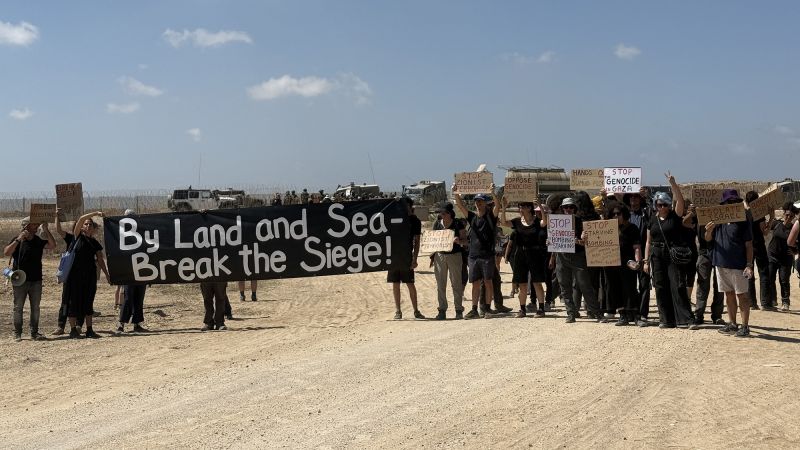Sure! Here’s a paraphrased version of the article organized into HTML format with headings and around seven paragraphs:
<div>
<cite class="source__cite vossi-source__cite">
<span class="source__location vossi-source__location">Jerusalem</span>
</cite>
<h2>Israeli Activists Protest at Gaza Border</h2>
<p>
On a sweltering September morning, dozens of Israelis gathered at the Gaza border fence—not as military personnel, but as protesters advocating for change. Their message was clear: they want the siege, which they believe is enacted in their name, to end.
</p>
<h2>Calls for International Action</h2>
<p>
The protesters, primarily Jewish Israelis, marched towards the border, urging the global community to impose sanctions and isolate Israel, demanding an end to what they termed “genocide” and the prolonged “Zionist apartheid regime.”
</p>
<h2>Minority Voices</h2>
<p>
“We know the government won’t change its stance, so we’re here to advocate for a boycott despite how absurd that may seem,” said Sapir Sluzker Amran, one of the attendees, during an interview with CNN. She recognized that her perspective represents a minority view in Israel.
</p>
<h2>Divergent Perspectives</h2>
<p>
Only a short distance away, the stark contrast in opinions was evident. In Sderot, a city frequently targeted by rockets and once attacked on October 7, residents gathered at an observation point to watch the destruction in Gaza, with some enjoying snacks and taking pictures while airstrikes could be heard in the background.
</p>
<h2>Reactions to the Conflict</h2>
<p>
Rafael Hemo, an observer, expressed his frustration, saying, “When I see buildings still standing in Gaza, it bothers me. I want Israel to continue until everything is gone.” He voiced a desire for no Arabs to remain near Israel, reflecting a sentiment that many Israelis have adopted following the violence on October 7.
</p>
<h2>Public Sentiment and Media Influence</h2>
<p>
Many Israelis remain fixated on the events of October 7, equating it to Israel’s 9/11, and until they feel a sense of closure, including the return of hostages, they see little reason to consider the consequences of the ongoing conflict. Recent polls indicate a majority of Israelis desire a ceasefire, but protests primarily emphasize recovering hostages while largely overlooking the impact on Palestinians.
</p>
<h2>Dehumanization and Media Representation</h2>
<p>
Dr. Ayala Panievsky, a researcher, argued that mainstream Israeli media has contributed to a systematic dehumanization of Palestinians, often omitting their suffering from coverage. This gap in understanding has widened the disconnect between how Israelis perceive the conflict and the broader narrative observed internationally.
</p>
<p>
Activists at the Gaza border maintain that even though calling for international isolation may seem drastic, it is crucial in light of their observations. “As an Israeli, I refuse to remain silent about the war crimes and genocide occurring in Gaza,” emphasized M., one of the protesters, underscoring the moral obligation they feel to oppose these actions.
</p>
</div>This version preserves the core information while presenting it in a structured format with headings.



